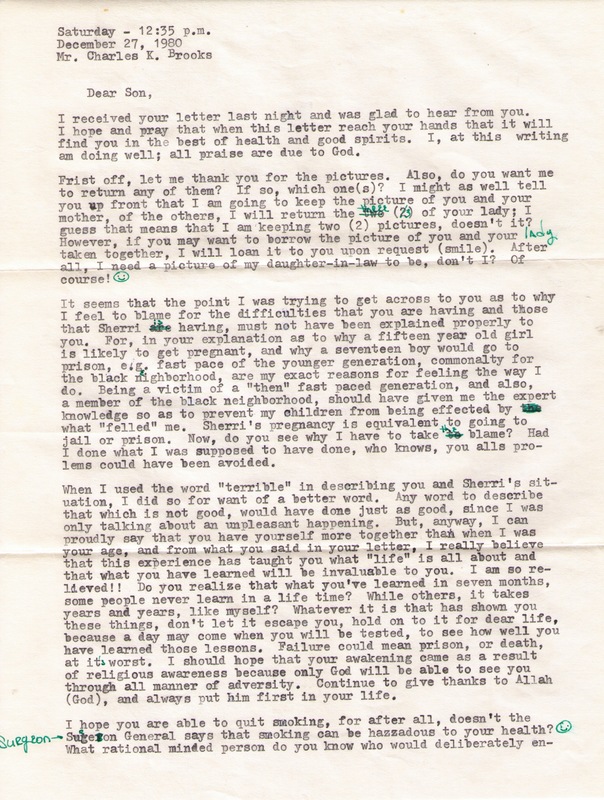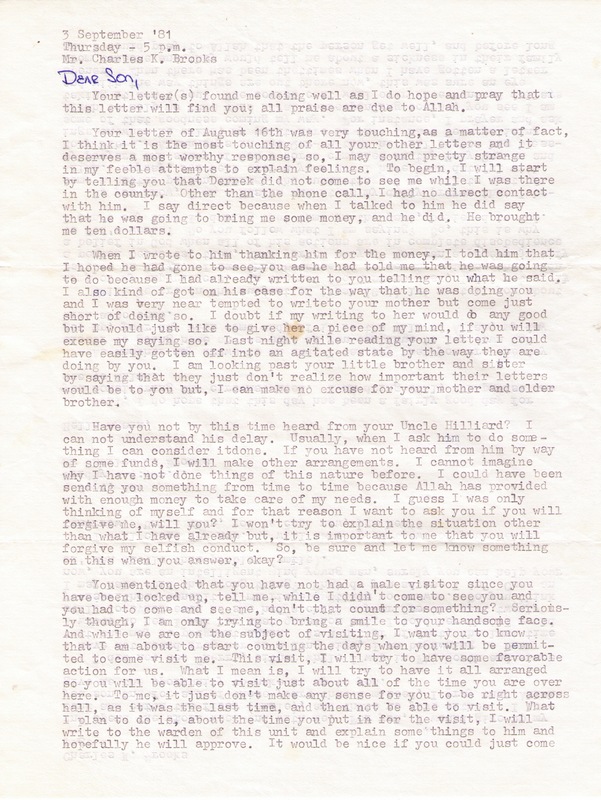The Right to Family
“The family is the natural and fundamental group unit of society and is entitled to protection by society and the State.” Article 16 Declaratin of Human Rights
In the Letter from Charles Brooks, to Charles Brook’s Jr. Son, Dated December 29, 1980, the primary source presents a typed letter with hand written edits. In the letter found from the Brooks Family Collection, Charles Brooks starts of his letter expressing how happy he was not only to receive his letter from his son, but also the photographs sent. He then goes on to apologize for not being there for him to offer guidance in person. He highlights an idea of “us versus them” when he writes, “Being a victim of ‘them’ fast paced generation, and also, a member of the black community, should have given the expert knowledge so as to prevent my children from being affected by what ‘felled’ me.” The them being referred to would be the system that was built against them. Even though he feels as though by being in prison he has caused it, his letter informing him on the structure still serves as a form of guidance. He goes on to give solid advice when he gives him advice about quitting smoking, but he also tells him to make a profit of selling cigarettes and how.
Brooks gives his son advice in most letters including Letter and Envelope addressed to Mr. Adrian K. Brooks from Charles Brooks Jr., dated November 1st, 1978. In this letter he urges his sons to “avoid the mistakes he made.” Brooks makes his life an example of what he doesn’t want to become. Although behind bars, their father is still alive and offers them support that only he can as a father. These letters and most of the letters include mundane details such as him drawing smiley faces in Letter from Charles Brooks, to Charles Brooks Jr.'s Son, Dated December 29, 1980 which humanizes him. He can be seen as more than an alleged murder, but also a father. These letters show that he still plays a role in his sons’ lives, and that there was going to be an effect on their family once he was killed.
When Charles Brooks apologizes for not being in his children's’ lives, he forgets that he is able to be there for them emotionally. His letters provide emotional support that gives guidance on topics such as family, livelihood, relationship and even religion. Charles Brooks was not the perfect father in anyway, but in the TAVP interview with Derrek Brooks, Brooks says “ Because back then, in the sixties and seventies, drugs were rampant in our community… And you know, my dad was a victim of it also. And that's why I say, you know, and he was a really good guy, the whole community loved him, but you know, he had demons that he had to wrestle with.” With these words and the tone in his voice, it is evident that despite his father not being a model citizen, he understood that it was an effect of a vicious cycle of drugs and its effect on the community. Derrek Brooks still cared for his father and his tone in this interview makes it clear that his father’s presence in his life was missed. By sentencing Charles Brooks to death, not only did it violate his inalienable right to life as mentioned in article 1, but it was a direct infringement of his rights mentioned in Article 16. In article 16, Section 3, it clearly states “The family is the natural and fundamental group unit of society and is entitled to protection by society and the State.” The Brooks family was not protected under this law when the law decided it was above human rights. Charles Brooks being served death row destroyed the structure of his family and took away a father from his children.
By Danielle Devonish


